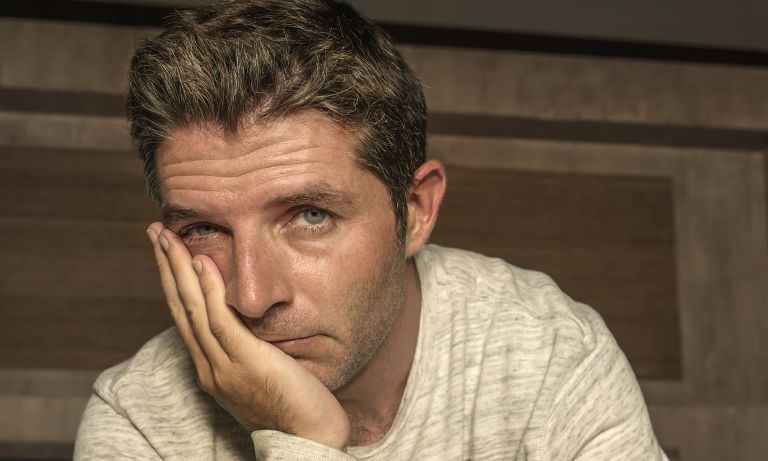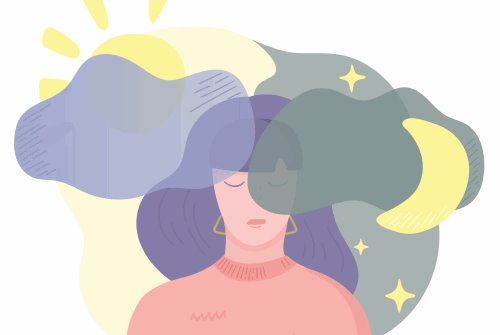Mixed bipolar disorder is a relatively new term used to describe a specific type of bipolar disorder. This type of bipolar disorder is characterized by the presence of both manic and depressive symptoms at the same time. Mixed bipolar disorder can be very difficult to diagnose, as the symptoms can vary from person to person. In this blog post, we will discuss the symptoms of mixed bipolar disorder, as well as treatment options.
Contents
What Is Mixed Bipolar Disorder?

Mixed bipolar disorder is a type of bipolar disorder that is characterized by both manic and depressive episodes. This can make it difficult to diagnose and treat, as the symptoms may mimic other mental health conditions.
The most common symptom of mixed bipolar disorder is feeling extreme swings in mood. These mood swings can go from feeling extremely happy or elated (known as a manic episode) to feeling very sad or down (known as a depressive episode). In between these two extremes, people with mixed bipolar disorder may also experience periods of normalcy.
Mixed bipolar disorder is thought to be relatively rare, occurring in about 1-2% of the population. However, this estimate may be skewed as the condition can often be misdiagnosed. For example, someone who experiences a depressive episode may be diagnosed with major depression, while someone who experiences a manic episode may be diagnosed with bipolar I disorder.
Mixed bipolar disorder can be difficult to treat as the symptoms can vary greatly from person to person. Treatment typically involves a combination of medication and therapy. If you think you or a loved one may be struggling with mixed bipolar disorder, it’s important to reach out to a mental health professional for help.
What Are the Symptoms of Mixed Bipolar Disorder?

Manic episodes associated with mixed bipolar disorder can last for at least a week and can include symptoms such as:
Feeling Unusually Energized or Irritable
One of the most common signs of a manic episode is feeling an unusual amount of energy. This can manifest as feeling wired or jittery, as well as feeling unusually irritable. Sometimes there may be many thoughts racing through your head, making it difficult to focus on any one thing.
Changes In Sleep Patterns
During a manic episode, you may find that you need less sleep or that you can’t sleep at all. This can leave you feeling exhausted, which can make it difficult to concentrate or function during the day.
Aggressive or Risky Behaviour
When in a manic state, you may act impulsively and take part in risky behaviors. This could include spending sprees, sexual promiscuity, or engaging in risky sports. You may also become more aggressive, picking fights with loved ones or strangers.
Delusions or Hallucinations
In some cases, people with mixed bipolar disorder may experience delusions or hallucinations. This can involve seeing or hearing things that aren’t there, or having false beliefs about oneself or the world around them.
Depressive episodes associated with mixed bipolar disorder can last for at least two weeks.
Feeling Sad, Empty, or Hopeless
One of the most common signs of a depressive episode is feeling persistently sad, empty, or hopeless. You may find that you’re not interested in activities that you used to enjoy and that you’re withdrawing from loved ones.
Loss of Appetite or Weight Loss/Gain
During a depressive episode, you may lose your appetite or find that you’re gaining or losing weight without trying. This weight loss or gain can be significant and may be a sign that something more serious is going on.
Constant Fatigue or Low Energy
Feeling tired all the time is another common symptom of a depressive episode. This fatigue can make it difficult to concentrate, get out of bed, or take care of daily responsibilities. Sometimes people may also experience aches and pains that don’t have an apparent cause.
Delusions or Hallucinations
Just as with manic episodes, people with mixed bipolar disorder may also experience delusions or hallucinations during depressive episodes. These could involve seeing or hearing things that aren’t there, or having false beliefs about oneself or the world around them.
These are some signs of mixed bipolar disorder, but it’s important to remember that everyone experiences the condition differently. If you think you or someone you know may be dealing with mixed bipolar disorder, it’s important to reach out to a mental health professional for help.
Causes of Mixed Bipolar Disorder

Some people may be born with a predisposition to bipolar disorder, which means that their genes make them more likely to develop the condition. Studies have shown that certain areas of the brain may be different in people with bipolar disorder, which could help explain why this condition runs in families.
Some other causes of mixed bipolar disorder may include:
Exposure To Stress
One of the most common triggers for mixed bipolar disorder is exposure to stress. This could be from a major life event, such as the death of a loved one, or day-to-day stressors, such as work or relationship problems. Sometimes, there may be many different stressors that combine to trigger the disorder. Stress may be from a major life event, such as the death of a loved one, or day-to-day stressors, such as work or relationship problems.
Certain Medical Conditions
Some medical conditions can trigger mixed bipolar disorder, such as thyroid problems, sleep disorders, and certain types of infections.
Some of these medical conditions are:
Thyroid Problems
One of the most common medical conditions that can trigger mixed bipolar disorder is an imbalance in the thyroid hormone. This can be caused by either an overactive or underactive thyroid gland.
Sleep Disorders
Another common trigger for mixed bipolar disorder is a sleep disorder. This could be something as simple as not getting enough sleep or having insomnia. Sleep disorders can also include sleep apnea, which is when a person stops breathing for short periods during sleep.
Certain Types of Infections
Some infections can trigger mixed bipolar disorder, such as meningitis, encephalitis, and syphilis. These infections usually affect the brain, which can then lead to changes in mood and behavior.
Substance Abuse
While not everyone who abuses drugs or alcohol will develop bipolar disorder, there is a link between substance abuse and the condition. Substance abuse can trigger mixed bipolar disorder or make it worse.
Some of the most common substances that can trigger mixed bipolar disorder are:
Alcohol: Alcohol is a depressant, which means it can cause a person to feel down. However, it can also act as a stimulant, which can lead to mania.
Cocaine: Cocaine is a powerful stimulant that can cause a person to feel energetic and happy. However, it can also lead to paranoia and delusions.
Marijuana: Marijuana is a relaxant, which means it can help a person feel calm and relaxed. However, it can also lead to anxiety and paranoia.
Amphetamines: Amphetamines are stimulants that can cause a person to feel energetic and happy. However, they can also lead to paranoia and delusions.
Environmental Factors
An individual’s environment can also play a role in the development of the mixed bipolar disorder. This includes things like family relationships, work stress, and financial problems.
Some environmental factors that may trigger mixed bipolar disorder are:
Family Relationships: If a person has a family member with bipolar disorder, they are more likely to develop the condition themselves. This could be due to genetics or simply because they learn behaviors from their family members.
Work Stress: Job-related stress can be a trigger for mixed bipolar disorder. This is especially true if the person feels like they have no control over their work situation. Some of these work stressors could include long hours, unrealistic deadlines, and difficult bosses.
Financial Problems: Money problems can be a trigger for mixed bipolar disorder. This is because financial stress can lead to a lot of anxiety and worry. Some of these financial problems could include being in debt, not having enough money to pay bills, or losing a job.
Trauma: One other environmental factor that can trigger mixed bipolar disorder is trauma. This could be something as major as a car accident or the death of a loved one. It could also be something more minor, such as being the victim of bullying or abuse.
Abuse: Sometimes, people with mixed bipolar disorder have a history of abuse. This could be physical, emotional, or sexual abuse. Abuse can lead to a lot of trauma, which can then trigger the development of the mixed bipolar disorder.
How Does Mixed Bipolar Affect Someone?
Affecting both the elated highs of mania and the lows of depression, mixed bipolar disorder is characterized by symptoms of both at the same time. This can make it hard to diagnose because the person experiences a range of emotions.
Mania is when a person feels an exaggerated sense of well-being, often accompanied by high energy levels and impulsive behaviors. Depression is when a person feels persistently sad or low and may have lost interest in activities they once enjoyed.
Some other impacts can be:
Work-Issues
One of the most common places that mixed bipolar disorder presents itself is in the workplace. It can be difficult to concentrate and be productive when you’re dealing with such extreme changes in mood. You may find yourself calling in sick more often, or getting into conflict with co-workers. There may also be many changes in job performance.
Problems with Friends and Family
The symptoms of mixed bipolar disorder can also take a toll on personal relationships. The unpredictable nature of the condition can make it hard to maintain close friendships or intimate relationships. You may find yourself isolating yourself from others, which can lead to feelings of loneliness and isolation.
Self-Harm
When someone is experiencing the lows of mixed bipolar disorder, they may turn to self-harm as a way to cope with the pain. This can include cutting, burning, or other forms of self-injury. If you’re struggling with self-harm, it’s important to get help from a mental health professional. Sometimes, people may also attempt suicide when they’re in a mixed bipolar state.
Treatment of Mixed Bipolar Disorder

Treating mixed bipolar disorder can be tricky, as the symptoms are constantly changing. The most important thing is to keep a close eye on your symptoms and seek help from a mental health professional if necessary. If you are in a mixed state, it is important to stay away from drugs and alcohol, as they can worsen your condition.
Some of these treatment methods are:
Medications
Medications are one of the most common treatments for mixed bipolar disorder. They can help stabilize mood swings and prevent future episodes.
Some of these medications that can be used to treat mixed bipolar disorder include:
Antidepressants: One of the most common types of medication used to treat mixed bipolar disorder is antidepressants. These medications can help regulate mood and prevent future episodes. Some anti-depressants that are commonly used to treat mixed bipolar disorder include fluoxetine (Prozac), sertraline (Zoloft), and paroxetine (Paxil).
Mood stabilizers: One of the most common treatments for mixed bipolar disorder is mood stabilizers. Mood stabilizers can help to even out the highs and lows of bipolar disorder and make it easier to manage the condition.
Common mood stabilizers include:
- Lithium
- Valproic acid
- Carbamazepine
- Lamotrigine
Antipsychotics: Antipsychotic medications can also help treat mixed bipolar disorder. These medications can help to reduce hallucinations, delusions, and other psychotic symptoms.
Common antipsychotic medications include:
- Aripiprazole (Abilify)
- Olanzapine (Zyprexa)
- Quetiapine (Seroquel)
- Risperidone (Risperdal)
Therapy
Another main method of treatment for mixed bipolar disorder is therapy. Cognitive behavioral therapy (CBT) can be particularly helpful in teaching people with mixed bipolar disorder how to manage their symptoms and recognize early warning signs of a relapse.
Family-focused therapy and psychoeducation are also important components of treatment. These types of therapies can help family members better understand the illness and how to support their loved one in recovery.
Other therapy options are:
Interpersonal and social rhythm therapy: This therapy helps people with bipolar disorder regulate their sleep patterns and daily routines, which can help stabilize mood swings.
Dialectical behavior therapy: This type of therapy can help teach people with mixed bipolar disorder how to deal with difficult emotions healthily.
Electroconvulsive therapy: This treatment may be an option for people with severe mixed bipolar disorder who haven’t responded to other treatments. During electroconvulsive therapy, electrical currents are passed through the brain to induce a seizure. This procedure is done while the person is under anesthesia.
Self-Care
Another important part of treatment for mixed bipolar disorder is self-care. This includes things like getting regular exercise, eating a healthy diet, and getting enough sleep.
It’s also important to find ways to reduce stress in your life. Some people find that relaxation techniques like yoga or meditation can be helpful. Others may prefer to read, listen to music, or spend time in nature.
Creating a support network of family and friends can also be beneficial. These people can provide emotional support and help you with day-to-day tasks when you’re feeling overwhelmed.
Conclusion
Mixed bipolar disorder is a very serious mental illness that can cause a great deal of distress and disruption in a person’s life. If you think you may have mixed bipolar disorder, it is important to seek professional help. With proper treatment, mixed bipolar disorder can be managed and people with this condition can lead fulfilling lives.
If you or someone you know is struggling with mixed bipolar disorder, there are many resources available to help. Also, please remember that you are not alone. Many people understand what you are going through and who want to help.
Hope this article was of help to you! If you are suffering from mental health disorders, you may seek help from Therapy Mantra. We have a team of highly trained and experienced therapists who can provide you with the tools and skills necessary for overcoming mental health disorders. Contact us today to schedule an online therapy or download our free Android or iOS app for more information.


